- Home
- Charles de Lint
Memory and Dream
Memory and Dream Read online
Memory and Dream
by
Charles de Lint
Copyright 1994 by Charles de Lint.
Smashwords Edition, License Notes:
This ebook is licensed for your personal enjoyment only. This ebook may not be re-sold or given away to other people. If you would like to share this book with another person, please purchase an additional copy for each person. If you’re reading this book and did not purchase it, or it was not purchased for your use only, then please return to Smashwords.com and purchase your own copy. Thank you for respecting the hard work of this author.
Dedicated to the memory of Ron Nance.
I’m gonna miss you, pal.
The leaves are coming down, another circle going round
Reminding me of you and brighter times
When I got the news I cried and later realized
I’ll carry a part of you for all my life
– Kiya Heartwood, from “No Goodbyes, No Regrets”
CONTENTS
La Liseuse
Footprints in the Dust
Baiting the Hook
The Wild Girl
Adjani Farm
The Bohemian Girl
Paddyjack
Kismet
Like Gypsies in the Wood
Journal Entries
Angels and Monsters
Vignettes from Bohemia
Journal Entries
Tertium Quid
Two Hearts As One, Forever Dancing
Open House
Afterword
Night hovers all day in the boughs of the fir tree.
– Ralph Waldo Emerson, from “Experience,” 1844
Our dreams make us large.
– Jack Kirby, from an interview on Prisoners of Gravity, TV Ontario; broadcast January 7, 1993
La Liseuse
The reading woman sits by the window, lamplight falling over her shoulder onto the book. It is the book that glows, a golden bath of lemon yellow faintly touched with orange, surrounded by violet shadows. The glow of the book casts a soft light onto the woman’s features, a soft light and softer shadows, and sets the tangle of her hennaed hair aflame.
It is possible to see diminutive figures in the shadows, crouching on the arms of the chair to peer at the words in the pages of the woman’s book, peeping out from in between the curls of her red hair. Tinier shapes still, not quite the size of mosquitoes, hover in the lamplight. Some are silhouetted against the curve of her throat and the shadow of her nose, others against the faint spray of freckles on brow and cheek.
Their heads are like those of fledgling birds: noses sharp and long, features pinched, brows high and smooth. Their figures – when in silhouette – are not unlike a tadpole’s. They have limbs like small crooked twigs, bird’s-nest hair that stands up in surprise and is ungovernably wild. Some have wings with the gossamer iridescence of a dragonfly’s.
The reading woman gives no indication that she is aware of their presence. The book captures her full attention. But surely she can feel the press of miniature bodies as they move against her arm, or the furtive movement as they slip in and about the curls of her hair? Surely she can see the tiny shapes flitting in the dusky air that lies between her grey-green eyes and the page?
Or perhaps they are only shadows, nothing more. And the summer’s night that lies outside her window belongs not to memory, but to dream.
La Liseuse, 1977, oil on canvas, 40 X 30 in. Collection The Newford Children’s Foundation.
Footprints in the Dust
Put your hand…
…Here.
Listen to my heart
beat.
– Ingrid Karidins, from the liner notes of A Darker Passion
September 1992
Katharine Mully had been dead for five years and two months, the morning Isabelle received the letter from her.
Standing by the roadside, Isabelle had to lean against her mailbox to keep her balance. Her knees went watery. A wave of dizziness started up in the pit of her stomach and rushed up between her temples. She no longer heard the world around her – not the birdsong from the cedars that courted the verge in a row of yellow-green and shadow, nor the sporadic traffic from the highway. All she could do was stare down in numbed incomprehension at the letter that lay on top of the bundle of mail she’d taken out of the box. The envelope was smudged and dirtied, one corner crinkled. The address was handwritten in a script that was oh so familiar.
It had to be a joke, she thought. Someone’s sick, twisted idea of a joke.
But the postmark was still legible and it was dated July 12, 1987 – two days before Kathy’s death. She must have had one of the nurses mail the letter and it had gone astray to spend more than five years in postal limbo, falling into a crack of the Post Office’s regular service, tucked away behind a conveyor belt or between someone’s desk and a wall until it was finally discovered and put back into the system.
Or perhaps it was the incomplete address that had caused postal clerks to scratch their heads for so many years: Isabelle Copley, Adjani Farm, Wren Island. That, and nothing more, so that the letter sat undelivered until it was noticed by someone who knew the archipelago of summer homes and ice-fishing huts of which Isabelle’s island was but one. Wherever the letter had been, now, half a decade later, when it finally finished its journey, when it finally lay in the hands of its intended recipient, Isabelle couldn’t open it. She couldn’t bear to open it.
She stuffed the envelope in among the rest of her mail and returned to her Jeep. She leaned her head against the steering wheel and closed her eyes, trying to still the rapid drum of her pulse. Instead, Kathy’s features floated up behind her eyelids: the solemn grey eyes and pouting lower lip, nose a touch too large, ears that stood out a bit too far but were usually hidden under a mass of red-gold hair, gilded with a fire of henna.
Isabelle wanted to pretend that the letter had never come, just as Kathy, lying there so pale and frail in the hospital, had wanted them all to pretend that she wasn’t dying. Isabelle wanted it to be 1972 again, the year she left the island to attend Butler University; the year her whole life changed, from farm to city, from everything she knew so well to a place where the simplest act was an adventure; the year she first met Kathy; the year before she’d fallen under Rushkin’s spell.
But that had never been Isabelle’s gift, reinventing the world as she needed it; that gift had been Kathy’s.
“What’s the world for if you can’t make it up the way you want it?” Kathy had once asked her.
“What do you mean, make it up?”
“Make it something other than what it is. Make it something more than what it is.”
Isabelle had shaken her head. “That’s not something we can do. We can’t just imagine things to be different. I mean we can, but it won’t really change anything – not in the real world.”
“If we don’t change the world to suit us,” Kathy had said, “then it’ll change us to suit it.”
“What’s so bad about that?”
“I don’t like who it can make me become.”
No, Isabelle had never mastered the knack of it. And in the very end, neither had Kathy.
Pushing the bundle of mail from her lap onto the passenger’s seat beside her, Isabelle sat up. Her vision was blurred and all she could see of the windshield in front of her was a haze. She gripped the steering wheel to keep her hands from shaking. The engine idled, a low throaty drone that played a counterpoint to the hollow rhythm of her own accelerating heartbeat. The ache in her chest was as familiar as the handwriting on the envelope that had reawoken the pain.
If she could have it all to do over once more, there was so much she would change. She would have listened to Kathy�
�s warnings. She wouldn’t have let herself fall prey to Rushkin and his promises. But most of all, she wouldn’t have let Kathy die. Given another chance, she’d give up her own life first. But malignant diseases paid no attention to anyone’s wants or wishes, and neither the world nor the past could be changed simply by wishing.
It was a long time before Isabelle finally put the Jeep into gear and returned to her landing. She tossed the bundle of mail into the bow of her rowboat, got in and cast off from the dock. She rowed with the steady strokes of a long familiarity with the task at hand, back to the island, her gaze on the receding shore but her thoughts circling around the memories of her friend. She’d become unusually adept at hiding them, even from herself, but the letter had drawn them up from out of the shadows and there was no putting them back now. They swept about her like a flock of noisy gulls, each clamoring for special attention, not one concerned with the pain their presence woke in her. They rose up from their secret places, pushing through the cobwebs, churning up a fine cloud that had lain undisturbed for years.
Isabelle was choking on their dust.
II
Alan slouched on his sofa, a half-filled tea mug balanced on his chest as he watched the evening news with the sound turned down. Not until his own features were replaced by those of the Mully family did he thumb the mute switch on his remote. Margaret Mully was holding forth, her eyes fired with the righteous indignation that Alan had long since learned she could turn on and off again at will. Her husband and surviving daughter stood on either side of her, willingly deferring the floor to her.
He’d seen the Mullys waiting impatiently for the reporters on the courtroom steps while he was trying to make his own escape from the cameras, but he hadn’t lingered to hear what Kathy’s mother had to say. He hadn’t needed to; he’d heard it all before. Yet his over familiarity with her rhetoric hadn’t stopped him from sitting through the news and listening to her now. He knew it was a perverse impulse. All it was going to do was make him angry, but he didn’t seem able to stop himself.
“Of course we’ll appeal,” Mully was saying. “The verdict handed down today was an appalling miscarriage of justice. Please understand, it’s not simply a question of money. Rather, it’s where the money will go. All we’re trying to do is preserve the good reputation of our daughter and to ensure that her work is presented to the public in its best possible light.”
Such as editing out any references Kathy had made to her childhood, Alan thought cynically, which would effectively undermine the principle theme of half the stories in the first collection. The bowdlerized versions would make no sense and render the affected stories unpublishable – certainly by the East Street Press’s standards. But Kathy’s mother was far more concerned with getting her hands on Kathy’s royalties, and in controlling what came back into print so that she could rewrite history.
What Mully meant to do with her daughter’s work cut a raw wound through Alan’s sense of aesthetic propriety. If she wanted to rewrite the past, he’d told the woman before all the lawyers became involved, let her do it in her own prose, under her own byline, though considering the woman’s lack of any real literary talent, it would never happen. Still, she was as stubborn as Kathy had ever been, and much as he hated to admit it, rewriting history was a trait that both mother and daughter had shared.
Kathy had always claimed that her parents were dead. If only that had been true.
On the television screen, one of the reporters was pressing Mully on a question that Alan wished they’d been able to raise in court, but the judge hadn’t allowed it. Kathy’s competency at the time she wrote her will was in question, not her mother’s motives.
“But what will you do with the money,” the reporter demanded, “if it isn’t donated to the NCF? A foundation that your own daughter was instrumental in establishing, I might add.”
Alan wondered if he was the only one to catch the momentary flash of anger in Mully’s eyes.
“We’ve been considering the creation of a trust fund or a scholarship,” Mully replied, “but we haven’t made any final decisions. It’s all still so upsetting …”
“But surely the NCF is just as worthy a cause?” the reporter went on. Alan decided he liked the woman. “And since it was your daughter’s –”
“The Newford Children’s Foundation panders to the offspring of prostitutes and drug addicts,” Mully broke in, her anger plain now to anyone viewing the broadcast. “If we don’t stop giving them handouts, then –”
Alan hit the “off’ switch on his remote and the television screen went black. He wished it were as easy to turn off Mully and her “decency crusade.” The saddest thing about giving a woman like that a forum was that right now throughout the city, people were sitting in their living rooms listening to her, nodding in agreement. But the children helped by the Newford Children’s Foundation came from every walk of life. The desperation that sent them looking for help made no distinction between secular or religious concerns, between the rich, the middle-class or the poor. It wasn’t concerned with the color of one’s skin or the lifestyle of one’s parents.
Alan set his tea on the coffee table and rose from the sofa to stand at the bay window facing Waterhouse Street. He remembered when they all lived here, in various apartments up and down the street. When they all followed their various muses, their paths crisscrossing through each other’s studios and offices, their writing and art and music fueling each other’s inspiration. Their sense of community had come apart long before Kathy’s death, but for him, Kathy’s dying had been the final page of the story collection they’d started when they all first came together in the early seventies.
Most of them still had their stories, and the stories went on, but they were rarely to be found in each other’s pages now. It wasn’t just a matter of having grown apart. The changes lay deeper, inside each of them, different for each of them. One expected growth, change; without it, the world was less, the well of inspiration dried up, the muses fled. But Alan had never expected there to come a time when most of those companions of his young adulthood would all be strangers. He hadn’t expected the bitterness or the estrangement that had wedged its way in between so many of their relationships.
He was still standing at the window when the telephone rang. He almost let his machine take the call, but finally turned back in to the room, crossed to his desk and lifted the receiver.
“Grant here,” he said.
“I hate it when you do that. Why can’t you answer the phone with a simple hello the way everybody else does?”
Alan smiled, recognizing Marisa’s voice. He glanced over to the mantelpiece, where a self-portrait she’d painted a few years ago hung just above a row of the East Street Press’s first editions. In the dim light, her shock of blonde hair seemed to glow, casting a light that radiated from the canvas.
“I don’t think I’ll ever measure up to your standards of propriety,” he told her. “The next thing I know, you’ll be wanting me to wear a tie to bed.”
“That depends. Are we talking necktie or bow tie? And would a tie be all you were wearing?”
Alan smiled. “And how are you, Marisa?”
“Right now I’ve got this picture in my head of you wearing nothing but a tie and I’m trying to decide if it’s amusing or scary.”
“Thanks so very much for that boost to my self-esteem.”
“You’re welcome,” Marisa said. “But that’s not why I was calling. Did you see the news tonight?”
“Margaret Mully in all her untrammeled glory? ’Fraid so.”
When he’d left the courthouse, Alan hadn’t felt as though he was coming away with a victory. But he should still have called Marisa to give her the news. It was like her not to bring that up.
“Well, congratulations anyway,” she said.
“Carson told me that her lawyers have already filed for an appeal.”
“Oh. And here I thought you’d finally won.”
“We did g
et the injunction lifted,” Alan said.
“So that’s good, right?”
“Well, it means we can go ahead and publish that omnibus edition we’ve had planned. And even if none of Kathy’s royalties go to the Foundation, at least I can give them any profit that I make. Christ knows they need the money.”
“And Isabelle’s still going to do the illustrations?”
Alan hesitated, then owned up. “Actually, I haven’t asked her yet.”
“Alan!”
“Well, there didn’t seem to be any point until I knew we could actually do the book. What if she’d done all the work and then we couldn’t publish?”
“The only person who might buy that line is yourself,” Marisa told him, “and frankly, if you do, then you’re dumber than I thought.”
Alan sighed. He looked across the room to where the night pushed up against the panes of his bay window. Beyond, in the darkness, he could sense ghosts haunting Waterhouse Street. Why was he the only one to remember how things once were? Or rather, why was he the only one who wanted to?
“Alan? Are you still there?”
“I don’t know if she’ll talk to me,” he said.
Now it was Marisa’s turn to hesitate.
“When was the last time you spoke to her?” she finally asked.
“At the funeral. No. One time after that. I tried calling her, but she hung up on me.”
He’d also written, but his letter had come back, Isabelle’s address scratched out and RETURN TO SENDER scrawled across the front of the envelope.
“If you can’t talk to her,” Marisa began. “If she won’t talk to you …” She gave up and started again: “Alan, why’ve you made it seem all along as though she’d be doing the book?”

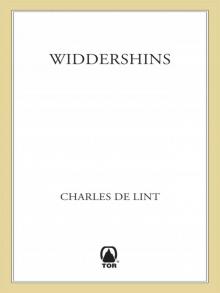 Widdershins
Widdershins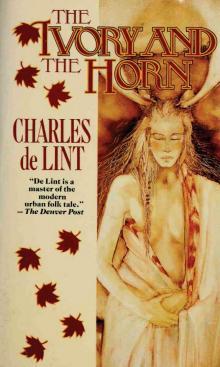 The Ivory and the Horn
The Ivory and the Horn Yarrow
Yarrow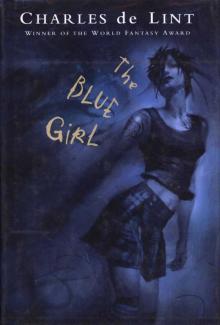 The Blue Girl
The Blue Girl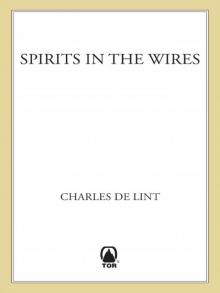 Spirits in the Wires
Spirits in the Wires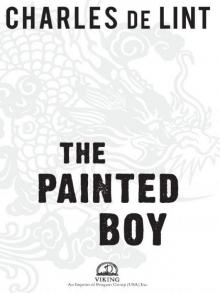 The Painted Boy
The Painted Boy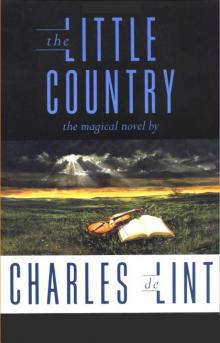 The Little Country
The Little Country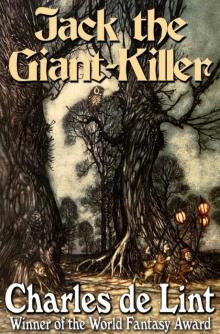 Jack of Kinrowan: Jack the Giant-Killer / Drink Down the Moon
Jack of Kinrowan: Jack the Giant-Killer / Drink Down the Moon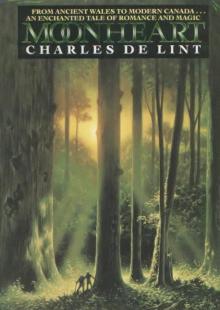 Moonheart
Moonheart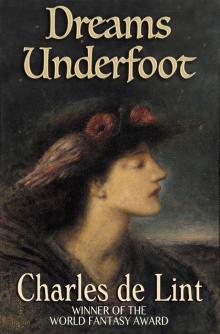 Dreams Underfoot
Dreams Underfoot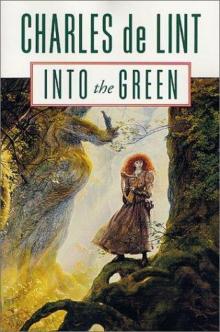 Into the Green
Into the Green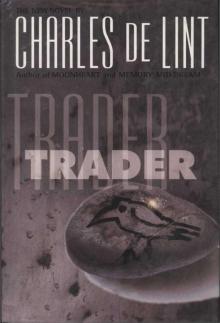 Trader
Trader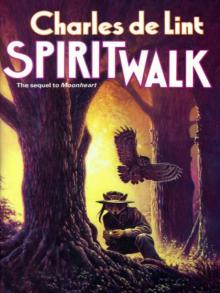 Spiritwalk
Spiritwalk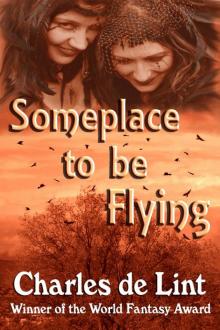 Someplace to Be Flying
Someplace to Be Flying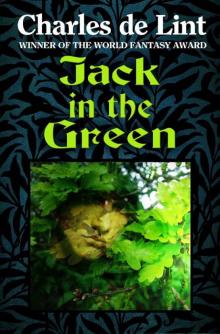 Jack in the Green
Jack in the Green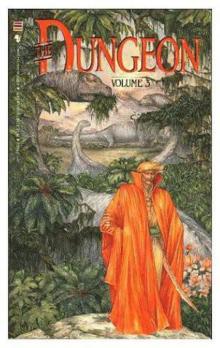 The Valley of Thunder
The Valley of Thunder Out of This World
Out of This World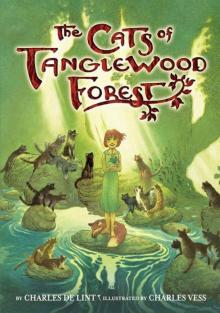 The Cats of Tanglewood Forest
The Cats of Tanglewood Forest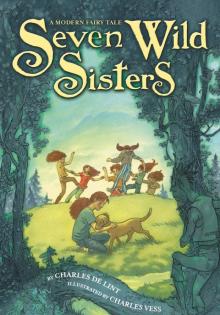 Seven Wild Sisters
Seven Wild Sisters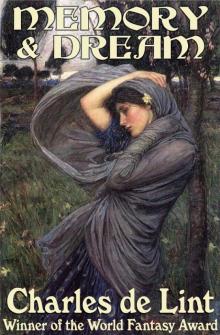 Memory and Dream
Memory and Dream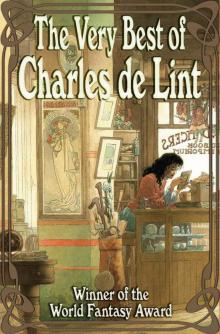 The Very Best of Charles De Lint
The Very Best of Charles De Lint Under My Skin
Under My Skin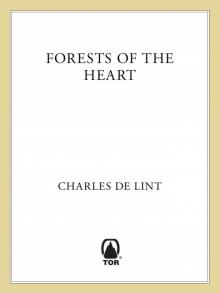 Forests of the Heart
Forests of the Heart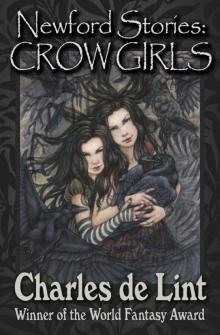 The Newford Stories
The Newford Stories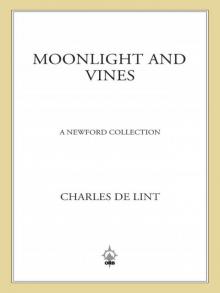 Moonlight and Vines
Moonlight and Vines Angel of Darkness
Angel of Darkness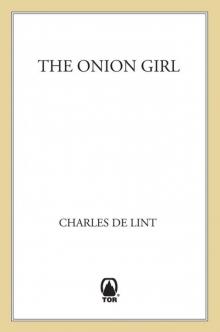 The Onion Girl
The Onion Girl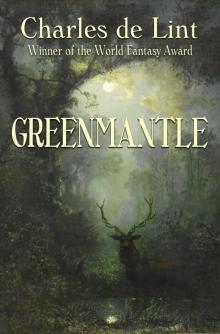 Greenmantle
Greenmantle Waifs And Strays
Waifs And Strays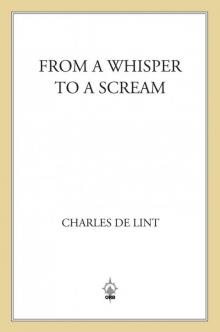 From a Whisper to a Scream
From a Whisper to a Scream Over My Head
Over My Head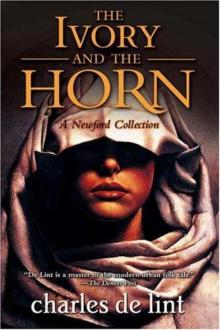 The Ivory and the Horn n-6
The Ivory and the Horn n-6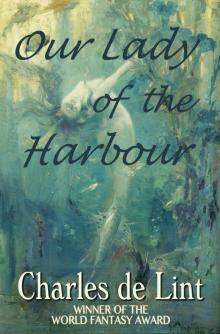 Our Lady of the Harbour
Our Lady of the Harbour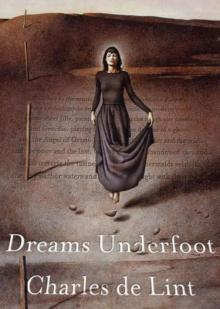 Dreams Underfoot n-1
Dreams Underfoot n-1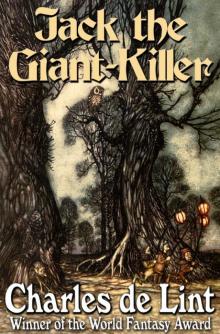 Jack the Giant-Killer (Jack of Kinrowan Book 1)
Jack the Giant-Killer (Jack of Kinrowan Book 1)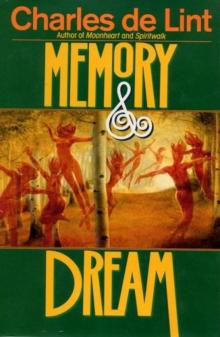 Memory and Dream n-5
Memory and Dream n-5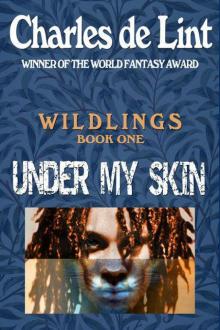 Under My Skin (Wildlings)
Under My Skin (Wildlings)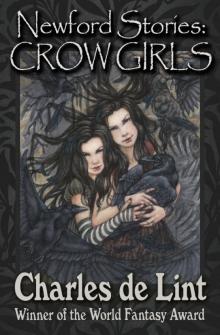 Newford Stories
Newford Stories The Wind in His Heart
The Wind in His Heart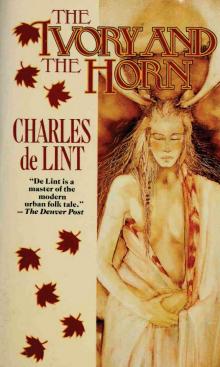 Ivory and the Horn
Ivory and the Horn